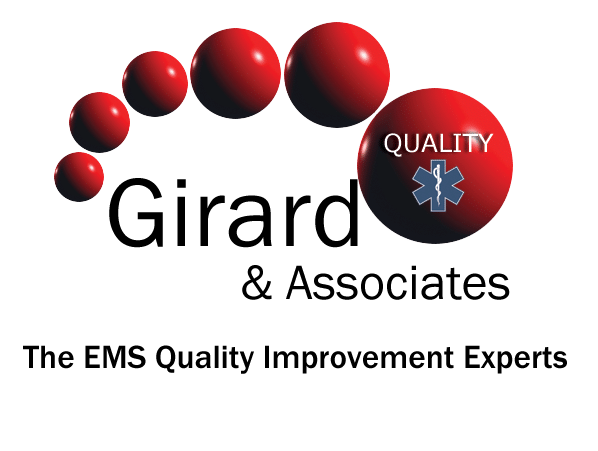The 4C’s of EMS CQI Leadership
Look up EMS CQI on the internet and you will find a wide variety of material related to how to perform CQI. What to measure, how to measure it, what and who you should be comparing yourself to. The list goes on and on. In fact, you could say everything you need to know about EMS CQI is probably out there somewhere waiting to be read and utilized.
So why is it that there are so many people who still have questions about how to do CQI in EMS, and why aren’t more programs successful at getting field providers to do the right thing at the right time? Why is there so much frustration on the part of CQI officers and agency management? I routinely field calls from EMS agency leadership asking why their process is not working and who are curious about what they can do to fix it.
Girard & Associates has been performing CQI for EMS agencies for over 18 years. We have experimented and tried pretty much every technique, theory, and process. Over the years we have refined the things that work most effectively and jettisoned the things that don’t. What have we learned over 18 years and several hundred thousand EMS call reviews? We have found that the fundamentals of performing CQI in EMS amounts to following principles that are consistent with getting positive changes from providers voluntarily and not under the threat of sanction or recrimination, gets the most lasting, positive change to occur most frequently. Those fundamentals can be summarized as “The 4 Cs of EMS CQI Leadership”.

You are a change agent!
Being an effective CQI coach is hard. The main goal is to get people to change their behaviors from lesser desirable patient care activities to more positive actions more likely to result in a positive patient outcome. You are a change agent!
The perceived skill set of a successful CQI manager is normally viewed as someone who is a good clinician, knows the protocol, understands concepts of patient care, company policy, OEMS regulation and the requirements of the service’s medical director. All of that is necessary but does not guarantee the CQI person will be successful in getting field providers to change behaviors.
So that leaves us with the question, what skill set is necessary to get providers to change patient care practices for the better. The answer is the 4 Cs of EMS CQI leadership. To be successful as a CQI professional, you need to master a different set of skills. Those skills include:
Command Presence
Competitiveness
Coach-able
Compassion
Command Presence
Most people think command presence is the ability “act like a boss”. That is just plain wrong. Command presence means the CQI leader has the ability earn others respect and trust by acting in a manner that encourages respect and trust. The CQI leader must have self-command of posture, tone, and inflection when speaking to others (what to say, when to say it, and how to say it) without applying undue pressure or using intimidation tactics. You have probably seen this in action in your own organization. The formal or informal leader who everyone just seems to trust and is the go-to person when a complex problem presents itself. This type of leader exhibits not only technical competency, but models’ high-performance behaviors that achieve the desired results. They model integrity, leadership, and competence.
Competitiveness
Competitiveness is another high-quality leadership behavior that people sometimes misinterpret. The competitiveness of the CQI coordinator is not to compete with others, but to compete with themselves. This leader is constantly in search of excellence and continuously strives to be better today than yesterday. They are excited to learn and have a passion for implementing their craft (improving the care of others). You will commonly see this CQI leader engrossed in EMS and medical literature as well as best practices and CQI material. They have a solid command of leadership principles, CQI theory (Deming, Baldridge, etc.) and are constantly learning new ways of influencing and encouraging others.
Coach-able
A truly exceptional CQI coordinator needs be able to both coach others and be coach-able themselves (coach-able). They need to be able to look in the mirror and see their own shortcomings and limitations and take proactive steps to mitigate both. Being able to coach others is an essential skill for CQI leaders to master. Instead of looking for the fault in others practices and making providers feel less than adequate, the CQI coach needs to make their followers feel as though the care they provide is good in many respects but encourage them to continuously improve (Continuous Quality Improvement). On the flip side, he/she needs to be able to admit mistakes of their own, be humble, and not be afraid to give credit where credit is due. True CQI leaders learn as much from their followers as they teach. They need to be able to receive well and give as good as they receive. Constantly strive to teach, coach and mentor and do a self-review of your performance after every provider interaction. In other words, CQI your own personal interactions and make corrections based on what you learn from each interaction. It also doesn’t hurt to give credit to field providers/staff members who have helped you be a better CQI leader!
Compassion
I left this one for last because it is the most important! If you remember one thing from the 4 Cs of EMS CQI leadership, it is to always be compassionate in your actions. EMS is a compassion profession. If our field providers lose their ability to be compassionate, then we have all failed. There have been recent articles and cases in the news of providers being less than compassionate. This does incredible damage to our profession and will make the lives harder for those who follow in our footsteps.
Just as we expect our patient care providers to be compassionate, the CQI leader often sets the example by compassionate leadership. Providers are people too and they experience the same range of emotions and challenges as the people they serve. To expect field providers to show compassion while agency leaders treat staff members with a lack of respect is hypocritical and creates significant staff/relations problems.
Compassion is not about “going easy” on people. In fact, CQI leaders need to be able to have the courageous conversations that need to be had to fix problems. It is how they have those conversations that make the difference. Be empathic, listen actively to what staff members are saying. Avoid judgmental statements (along with body language and other non-verbal cues). Be authentic and humanistic in every interaction and remember, people see how you act when you don’t realize they are watching. Your goal is to meet the providers expectations of a constructive, educational, and informative CQI session. Don’t let them down!
If you would like to learn more about the 4 Cs of EMS CQI leadership, listen to our podcast on the topic for a more in-depth discussion and examples of each of the 4 C’s. You can hear it on any of the major podcast streaming services or on out website www.girardassoc.com.



